#pious predecessors
Text
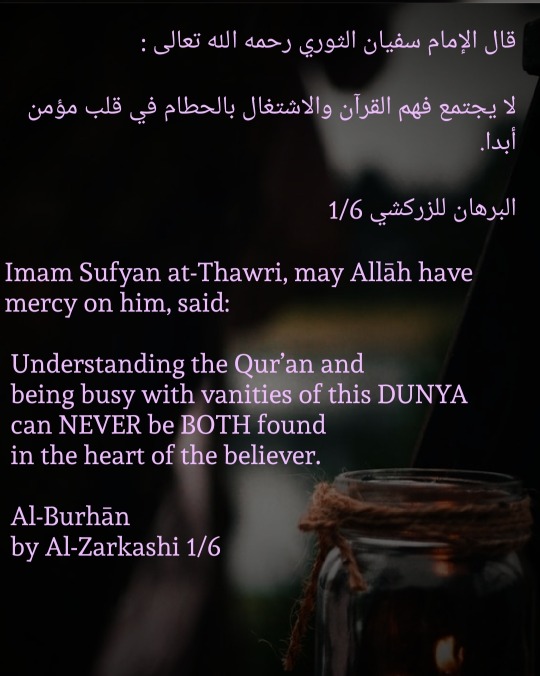
#sunnah#salaf#pious predecessors#islamic reminder#islam post#salafi#ahlulhadith#alhulsunnah#manhaj salaf#Islam
4 notes
·
View notes
Text
"[Elizabeth Woodville's] piety as queen seems to have been broadly conventional for a fifteenth-century royal, encompassing pilgrimages, membership of various fraternities, a particular devotion to her name saint, notable generosity to the Carthusians, and the foundation of a chantry at Westminster after her son was born there. ['On other occasions she supported planned religious foundations in London, […] made generous gifts to Eton College, and petitioned the pope to extend the circumstances in which indulgences could be acquired by observing the feast of the Visitation']. One possible indicator of a more personal, and more sophisticated, thread in her piety is a book of Hours of the Guardian Angel which Sutton and Visser-Fuchs have argued was commissioned for her, very possibly at her request."
-J.L. Laynesmith, "Elizabeth Woodville: The Knight's Widow", "Later Plantagenet and Wars of the Roses Consorts: Power, Influence, Dynasty"
#historicwomendaily#elizabeth woodville#my post#friendly reminder that there's nothing indicating that Elizabeth was exceptionally pious or that her piety was 'beyond purely conventional'#(something first claimed by Anne Crawford who simultaneously claimed that Elizabeth was 'grasping and totally lacking in scruple' so...)#EW's piety as queen may have stood out compared to former 15th century predecessors and definitely stood out compared to her husband#but her actions in themselves were not especially novel or 'beyond normal' and by themselves don't indicate unusual piety on her part#As Laynesmith's more recent research observes they seem to have been 'broadly conventional'#A conclusion arrived at Derek Neal as well who also points out that in general queens and elite noblewomen simply had wider means#of 'visible material expression of [their] personal devotion' - and also emphasizes how we should look at their wider circumstances#to understand their actions (eg: the death of Elizabeth's son George in 1479 as a motivating factor)#It's nice that we know a bit about Elizabeth's more personal piety - for eg she seems to have developed an attachment to Westminster Abbey#It's possible her (outward) piety increased across her queenship - she undertook most of her religious projects in later years#But again - none of them indicate the *level* of her piety (ie: they don't indicate that she was beyond conventionally pious)#By 1475 it seems that contemporaries identified Cecily Neville as the most personally devout from the Yorkist family#(though Elizabeth and even Cecily's sons were far greater patrons)#I think people also assume this because of her retirement to Westminster post 1485#which doesn't work because 1) we don't actually know when she retired? as Laynesmith says there is no actual evidence for the traditional#date of 12 February 1487#2) she had very secular reasons for retiring (grief over the death of her children? her lack of dower lands or estates which most other#widows had? her options were very limited; choosing to reside in the abbey is not particularly surprising. it's a massive and unneeded jump#to claim that it was motivated solely by piety (especially because it wasn't a complete 'retirement' in the way people assume it was)#I think historians have a habit of using her piety as a GOTCHA!' point against her vilification - which is a flawed and stupid argument#Elizabeth could be the most pious individual in the world and still be the pantomime villain Ricardians/Yorkists claim she was#They're not mutually exclusive; this line of thinking is useless#I think this also stems from the fact that we simply know very little about Elizabeth as an individual (ie: her hobbies/interests)#certainly far less than we do for other prominent women Margaret of Anjou; Elizabeth of York;; Cecily Neville or Margaret Beaufort#and I think rather than emphasizing that gap of knowledge her historians merely try to fill it up with 'she was pious!'#which is ... an incredibly lackluster take. I think it's better to just acknowledge that we don't know much about this historical figure#ie: I do wish that her piety and patronage was emphasized more yes. but it shouldn't flip too far to the other side either.
22 notes
·
View notes
Text
Whoever’s Jumuʿah is safe from evil, his week will be safe from evil.
Whoever’s Ramaḍān is safe from evil, his year will be safe from evil.
Whoever’s ḥajj is safe from evil, his life will be safe from evil.
Ibn al-Qayyim
4 notes
·
View notes
Text
"When a child of any of the pious predecessors would grow up, they would busy him in memorising the Qur'ān and learning Ḥadīth, so that īmān would become firm in his heart."
(Al-Ḥāfiẓ Ibn al-Jawzī ❲may Allah have mercy on him❳, Ṣayd al-Khāṭir, p. 491)
قال ابن الجوزي رحمه الله :
كان السلف إذا نشأ لأحدهم ولد شغلوه بحفظ القرآن وسماع الحديث فيثبت الإيمان في قلبه .
[صيد الخاطر (ص491)]
#child #pious #predecessors #grow #busy #memorising #Quran #learning #Hadith #Iman #firm #heart

0 notes
Text
What To Do When The Truth Comes Out From The Devil's Mouth?
What To Do When The Truth Comes Out From The Devil’s Mouth?
”لا تنظر إلى من قال وانظر إلى ما قال.“ – علي بن أبي طالب “Don’t look at the one who made the statement instead look at the statement.” – Ali Ibn Abi Talib Because the truth once came out from the devil’s mouth and the prophet called it as it is. Allah elevates those who are humble. And by the prophet s.a.w definition, a humble man is one who “doesn’t belittle people and accepts the truth” even if…
View On WordPress
0 notes
Text

Al-Awzaa’ee رحمه الله said:
“Stick firmly to the narrations of the Salaf (the Pious Predecessors) even if people reject (abandon) you. And beware of the opinions of men even if they adorn it for you with beautiful speech.”
[ Ash-Sharee’ah [of al-Aajurree] (no. 63) ]
100 notes
·
View notes
Note
They way I've seen Zionists call Anti-Zionists "self-hating Jews" is on the same level as Salafists/Wahhabists doing Takfir (declaring a Muslim an disbeliever)// uh??? who are those? Salafists & Wahhabist? weird names
Salafism is a movement within Sunni Islam. It's a group of Muslims that emphasise individual interpretation (ijtihad) of Sunni Hadiths and Qur'anic interpretation in the way of the "pious predecessors" (=salaf). The Salafs were basically Muslim scholars in the first three centuries of Islam. They're pretty strict and adhere to a fundemantal doctrine of Sunni Islam with a literalist interpretation (athari). They reject the notion of Taqlid (following a school of thought on Islamic opinions). While they don't deny the opinions of these schools, they simply hold that laymen Sunnis should adhere to ijtihad. They are particularly invested in the works of Ibn Taymiyyah, an extremist scholar, who is notorious for his polemics against other Islamic groups or heterdox interpretation of Islam and its followers, mostly Shi'a Islam. Wahhabism is a particular movement within Salafism that follows the opinions of Muhammed ibn Abdul Wahhab.
Al-qaeda, ISIS, Jaysh al-Islam, Tahrir al-Sham are a few examples of Salafist groups.
74 notes
·
View notes
Text
Some World Details/Names
Marave is the continent on which the game takes place.
Palshaam is the holy land of the Avinite Faiths, and a strategic area. It is located at the eastern edge of the Nostran Sea, and serves as the main gateway to Levane, also known as the Orient.
The Avinite Faiths are the dominant religions of Marave, Yafran, and Palshaam. They take their name from the holy figure Avinus.
The eldest branch of the faith is the Yudai. They are dominant in only a small area, in the south of Palshaam, the Kingdom of Gherush.
The middle branch of the faith is the Houdai. They are dominant in Marave, and headed by the Hierophant.
The youngest branch of the faith is the Salmai. They are dominant in Yafran and most of Palshaam.
The Nostran Sea is a large body of water, separating southern Marave from northern Yafran and providing all the benefits one would expect. To the west of the Sea, past the Sunset Gate (a large strait separating the Maravian region known as the Hiber peninsula from the Yafranite region known as Temurkut), is the Promeantic Ocean, the western edge of the known world.
The Reman Empire was the predecessor of most kingdoms around the Nostran Sea. It fell more than five centuries ago, and despite attempts no one has yet reunited the empire.
The Pious Reman Empire is the Hierophant-endorsed successor state, encompassing Alemagne in the north, Beheimat in the east, Oenotry in the south, and Gundiny in the west.
Ribaur is the country to which you swear fealty.
Pritani is an island north of Marave and just across a channel from Ribaur.
Sayland is the southern Pritannian kingdom, ruled by a former Ribaurian noble.
Iremia was an ancient empire in southwest Marave, highly advanced in magic compared to the modern kingdoms. Thousands of years ago, the Iremi were closely associated with the dragon priests of the east, but they went to war and destroyed each other.
Amykheimr was the capital city and greatest achievement of Iremia.
Skadesi is a large peninsula to the north of mainland Marave, and to the east of Sayland. For many decades, the inhabitants terrorized the coast as far south as Temurkut, but the after the populace converted to Houdai the raids stopped. Today, both the Kingdom of Sayland (including the formerly Ribaurian Duchy of Ostromandy) and the island of Siciny are ruled by the descendants of these raiders.
Ostroway is the westernmost Skadesite kingdom. The Ostrowegian king made a bid for the throne of Sayland a generation ago, but failed.
21 notes
·
View notes
Text

Allah calls Himself Al-Qadeer— The Powerful— on one occasion in the Quran. Al-Qadeer is the One with complete power. He is the One who decrees; He simply says, Be! and it is. Al-Qadeer needs no means to do anything!
The Powerful, The All-Capable
Qadeer comes from the root qaaf-daal-raa, which points to four main meanings. The first meaning is to have the power to accomplish, to be capable. The second is to measure, to distribute something, or to make manifest. The third is to decree or ordain and the fourth is to prevail.
This root appears 132 times in the Quran in 11 derived forms. Examples of these forms are yaqdiru (“he has power”), qaddarnaa (“we have decreed”), al-qadr (“of power”) and qaadirun (“is Able”).
Allah ‘azza wajal refers to Himself with the nominal qadeer 45 times in the Quran, of which one mention is Al-Qadeeru, The Powerful.
Linguistically qadeer, qaadir, and muqtadir are all derived from the root qaaf-daal-raa and all of them demonstrate that power is established as an attribute of Allah and that He has absolute Power. He is the One who is capable of doing everything, who has perfect power over the creation, who measures everything with perfection, and who is the One who decrees all that was, is, and will ever be. His ability combined with His infinite Knowledge makes Him Al-Qadeer and Al-Aleem!
Al-Qadeer Himself says: . . . Allah is the one who created you from weakness, then made after weakness strength, then made after strength weakness and white hair. He creates what He wills, and He is the Knowing, the Competent [Quran, 30:54]
. . . Blessed is He in whose hand is dominion, and He is over all things competent [Quran, 67:1]
… If He wills, He can do away with you, O people, and bring others [in your place]. And ever is Allah competent to do that [Quran, 4:133].
Power and Mercy
Al-Qadeer has the power to replace a whole nation with another one in whatever way He wants. With His power He can make large pieces of the earth lifeless and at the same time grant or withhold great amounts of possessions from whomever He wills.
Just as the power of His punishment is unparalleled, so is His power to grant mercy to His sincere slaves. As a reward for their patience, certainty of faith, and trust in Him, Al-Qadeer uses His power to help His servants out of difficulties.
We find beautiful examples of His power in saving Ibrahim ‘alayhi sallam from the fire, Yunus ‘alayhi sallam from the belly of the fish, Yusuf ‘alayhi sallam from the well, and the other innumerable moments He helps, relieves, saves, and comforts His servants throughout their lives.
How Can You Live By This Name?
1. Know that everything is predestined.
How often have you been upset because you’ve lost money, possessions, or a job? Some even respond immediately by asking, Why me? What did I do wrong?
Remind yourself in good and bad times of the following powerful hadith and let it increase you in tawakkul (reliance) upon Al-Qadeer at all times! The Prophet salallahu ‘alayhi wa sallam said: Know that even if the whole community were to gather together to benefit you with something, they would not benefit you with anything except that which Allah has already recorded for you, and that if they gather together to harm you with something, they would not be able to harm you with anything except that which Allah has already recorded against you. [At-Tirmidhee]
Cure your heart from rancor and envy by believing that all affairs are by the decree of Al-Qadeer!
2. Be content.
Follow the pious predecessors by striving to be content with the decree of Al-Qadeer. This means that you realize that everything that happens to you is pre-destined but also that you try to not feel any bitterness when you are tested.
Rida (contentment) is the praiseworthy station of not only recognizing, but also being pleased with the decree of Allah. Don’t ever let your love for Al-Qadeer decrease when something doesn’t go your way! Contentment is the greatest door that one enters to Allah, It is the source of tranquility for the worshiper and paradise on earth. Whoever does not enter it will not enter the Paradise in the Hereafter [Ibn Taymiyyah]
3. Pray istakhaarah.
Whenever you have a decision to make, no matter how big or small, consult Al-Qadeer and ask Him to choose what is best for you and your deen, in this life and in the Hereafter, by praying the sunnah istakhaarah prayer.
4. Say alhamdulillah.
It’s easy to say alhamduilliah when good happens to you, but we should also praise Al-Qadeer when we go through hardship. Next time you are tested, say alhamdulillah from your heart and mean it, and inspire others to do so! Alhamdulillah ‘alaa kulli haal – all praise belongs to Allah in any case or siltation, no matter what He decrees!
5. Express your need to Al-Qadeer.
By nature we love those who are competent. For example, when you are weak you desire the protection of someone who is strong. Know that Al-Qadeer can make everything happen by His Power, so ask Him. Seek refuge in Him for protection, ask Him to cure your heart, and know that there is no limit to His power.
Only Al-Qadeer is able and fully capable to give you a way out of every difficulty. The Prophet salallahu ‘alayhi wa sallam said, If anyone constantly seeks pardon (from Allah), Allah will appoint for him a way out of every distress and a relief from every anxiety, and will provide sustenance for him from where he expects not. [Abu Dawud]. So increase your istighfaar (seeking forgiveness) by saying astaghfirullah.
Wallahu ta’alaa ‘alem.
O Allah, Al-Qadeer we know that Your power is perfect. Adorn us with patience and contentment with your decree and help us inspire others to do so. Help us to turn to You and to consult You in big and small matters, and enable us to seek Your forgiveness in abundance. Ameen!
#allah#islam#revert help team#asma al husna#revert help#muslim#ayat#daily#allah’s name#dua#pray#prayer#salah#muslimah#hijab#religion#reminder#mohammed#new muslim#new revert#new convert#how to convert islam#converthelp#convert islam#become a muslim#welcome to islam#daily ayat#prophet#god#revert
14 notes
·
View notes
Text
🌸Friday Series🌸
by Asma bint Shameem
🌿Seize the Last Hour today🌿
Today is a beautiful chance to make duaa for our brothers and sisters in Palestine.
That’s because there’s a SPECIAL TIME on Fridays when our Duaas are GUARANTEED to be accepted.
🍃 The Prophet sal Allaahu Alayhi wa sallam said:
“The day of Friday has twelve hours, in which there is no Muslim slave who asks Allaah for anything but He will grant it to him, so seek it in the last hour after ‘Asr.”
(Abu Dawood, and an-Nasaa’i- saheeh by al-Albaani)
This is known as Sa’at al-Istijaabah (a time when Duaa is answered)
So the Duaa that’s made before Maghrib on Fridays is answered.
That’s why some of our pious predecessors would close their businesses, leave the world behind and confine themselves to the masjid after Asr, just to make Duaa.
🍃When Mufaddal bin Fudhaalah would pray Asr on Fridays, he would seclude himself alone to a corner of the masjid and then continue making duaa until the sun would set.
🍃 Similarly, Sa’eed bin Jubayr would pray Asr, then he would not speak to anyone until the sun would set - meaning that he would busy himself with duaa.
🍃 Ṣalt bin Bastaam once became blind, so his brothers sat after Asr on Friday making duaa for him, and suddenly before the sun set, he sneezed and his sight returned!
So be SURE to make good use of this time.
Free yourself up of all other distractions and make special efforts to set aside this time only for duaa.
Beg Allaah for His Mercy on the people of Palestine and the rest of the Ummah.
Be sincere and make taubah of all your sins.
Cry and beseech His Help and victory in that SPECIAL ‘HOUR’ when Duaa is accepted on Fridays, this evening.
🍃 Ibn al-Qayyim said:
“The Hour of Response in it (i.e. Friday) is like the Night of Decree in Ramadhaan.”
(Zaad al-Maa’d 1/398)
Surely Allaah’s Help is near.
15 notes
·
View notes
Text
Shaykh ibn ‘Uthaymeen, [may Allah have mercy on him], said:
“Celebrating Valentine’s Day is impermissible for several reasons:
Firstly, it is an innovated holiday with no basis in Sharee‘ah.
Secondly, it promotes passion and infatuation.
Thirdly, it distracts the heart from more significant matters, contrary to the guidance of the Pious Predecessors and their Successors, [may Allah be pleased with them].”
Majmu’ Fatawa wa Rasail Fadeelat ush-Shaykh Muhammad bin Salih al-‘Uthaymeen [may Allah have mercy on him], 16/199
#islam#quote#allah#hijab#knowledge#inspirational quotes#islam4 life#islamicadvice#jilbab#la ilaha illa allah#islamicreminder#islamicart#islamicquotes#islamic#muslimah#muslim reminder#muslim
13 notes
·
View notes
Text
Reminder in Arabic translated below
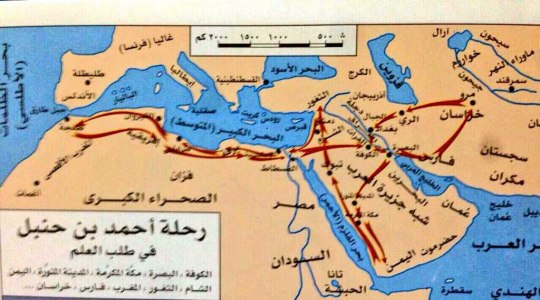
⬆️
رحلة أحمد بن حنبل في طلب العام
Travels of Ahmad bin Hanbal in seeking knowledge
The red arrows show how he travelled throughout the Muslim world, from Khorasan to what is nowadays Morocco, in his search for knowledge.....
الكوفة، البصرة، مكة المكرمة، المدينة المنورة، اليمن، الشام، الثغور، المغرب، فارس، خرسان....
Al Koofah (city located in what is known today as Iraq), Al bassrah (city located in today's Iraq), Makkah Al mukarramah, Al madeenah Al munawwara, ash Shaam (Syria- Palestine), ath thagour, Al Maghrib (Morocco, Algeria), Faaris (Persia), Khorasan (in today's north Eastern Iran)...
انظُرْ كَيف كَان علماؤنا يجتهدون في طلبهم للعلم، يَقْطَعُون البحار، ويرتحلون في القفار، خُطَاهُم نفعت الإسلام والمسلمين، وكلامهم أنار دُرُوبَ الهُدى للسَّالكين، فرحمة الله عليهم جميعا
⚠️فلا تتكاسل يا طالب العلم، ولا تتهاون في الهدى والفهم، فهؤلاء سلفك الصالحون أدُّوا ما عليهم في أزمانهم، وعَمَّروا بالخير أعمارهم وأوقاتِهم، فنفعوا بعلمهم البلاد والعباد إلى يوم الدين
فنسأل الله أن ينفعَنا بعلومهم، وأن يرزقنا التشبه بأخلاقهم وسلوكهم، إنه على كل شيء قدير
See how our scholars used to strive to seek knowledge, traversing seas and wastelands, benefitting through their steps Islam and the Muslims. Their words enlightened our paths with guidance, so may Allah have mercy on them all.
⚠️Therefore, O seeker of knowledge, do not be lazy, and do not be negligent in finding understanding and guidance, for these are your pious predecessors, who gave their due, during their lifetimes, and filled their time with kheir (all that is good); they benefitted (many) countries with their knowledge, and (will do so) until the Day of Judgment.
We ask Allāh to benefit us with their knowledge, and to bless us with imitating their morals and behaviour. Allāh is capable of everything.
Copied from the Algerian Mashaykh upon the Manhaj of as Salaf as Salih channel
#ahlulhadith#ahlulsunnah#islamicreminder#islamic history#islamic knowledge#manhaj salaf#quran&sunnah#salaf#islampost#sunnah
72 notes
·
View notes
Text
One of the Pious Predecessors and Successors said:
Everytime I increased [reciting] my [daily] portion of the Qur’ān; blessings increased in my time, [so much so] that I kept on increasing my daily portion, until I read ten parts [a third of the Qur’ān].
- Al-Imām ibn Rajab [may Allāh have mercy on him], Dhayl Tabaqāt al-Hanābilah 3/205
74 notes
·
View notes
Text
Fifth part of the bookscans of Al Andalus. Historical Figures, here's the previous part
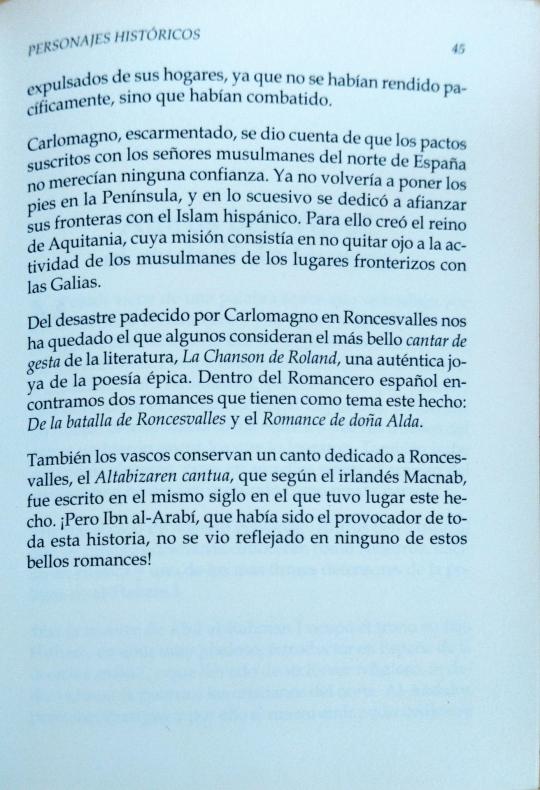
expelled from their homes, since they had not surrendered peacefully, but had fought.
Charlemagne, chastened, realized that the pacts signed with the Muslim lords of northern Spain deserved no trust. He would never set foot on the Peninsula again, and subsequently dedicated itself to strengthening its borders with
Hispanic Islam. For this he created the kingdom of Aquitaine, whose mission
consisted of not taking our eyes off the activity of the Muslims of the
places bordering Gaul.
From the disaster suffered by Charlemagne in Roncesvalles we have
remains what some consider the most beautiful song of deeds of literature, La Chanson de Roland, an authentic gem of the epic poetry. Within the Spanish Ballads we find two romances that have this fact as their theme: Of the battle of
Roncesvalles and the Romance of Doña Alda.
The Basques also preserve a song dedicated to Roncesvalles, the Altabizaren cantua, which according to the Irishman Macnab, was written in the same century in which this event took place. But
Ibn al-Arabí, who had been the originator of this whole story, was not reflected in any of these beautiful romances!
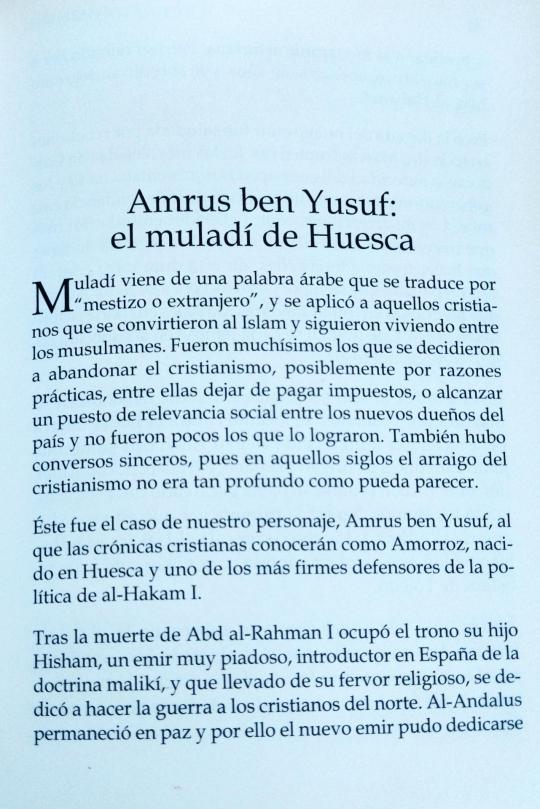
Amrus ben Yusuf:
the muladí of Huesca
Muladí comes from an Arabic word that translates as "mixed race or foreigner", and was applied to those Christians who converted to Islam and continued living among the Muslims.
There were many who decided
to abandon Christianity, possibly for practical reasons, including stopping paying taxes, or reaching a position of social relevance among the new owners of the country and there were not a few who achieved it. There was also sincere converts, since in those centuries the roots of the Christianity was not as deep as it may seem.
This was the case of our character, Amrus ben Yusuf, whom the Christian chronicles will know him as Amorroz, born in Huesca and one of the staunchest defenders of the policies of al-Hakam I.
After the death of Abd al-Rahman I, his son Hisham, a very pious emir, introducer of the Maliki doctrine in Spain, and who
Driven by his religious fervor, he dedicated himself to waging war on the Northern Christians. Al-Andalus remained at peace and therefore the new emir was able to dedicate himself
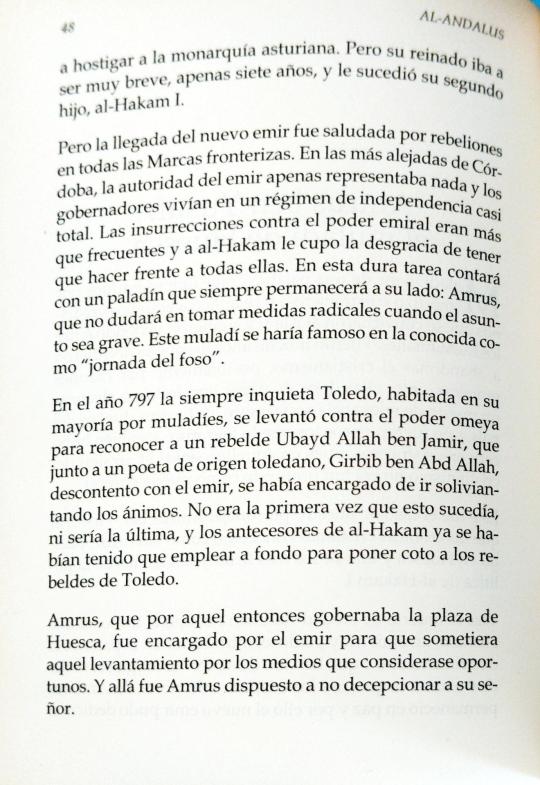
to harass the Asturian monarchy. But his reign was to be very short, just seven years, and was succeeded by his second son, al-Hakam I.
But the arrival of the new emir was greeted with rebellions in all the border marches. In the most remote areas of Córdoba, the authority of the emir hardly represented anything and the governors lived in a
regime of almost total independence. The insurrections against the power of the emirate were more than frequent and al-Hakam had the unfortunate luck to have to face them all. In this hard task, he will have a paladin who will always be at his side: Amrus, who will not hesitate to take radical measures when the matter is serious. This muladí would become famous on what was known as the “day of the pit.”
In the year 797, the always restless Toledo, inhabited mostly by muladíes, rose up against the Umayyad power to recognize a
rebel Ubayd Allah ben Jamir, who together with a poet of Toledo, Girbib ben Abd Allah, dissatisfied with the emir, had
in charge of calming down the spirits. It wasn't the first time this happen, nor would it be the last, and al-Hakam's predecessors had already had to work hard to put a stop to the rebels of Toledo.
Amrus, who at that time ruled the stronghold of Huesca, was commissioned by the emir to subdue that uprising by the means that it considers opportune. And there went Amrus willing not to disappoint his lord.
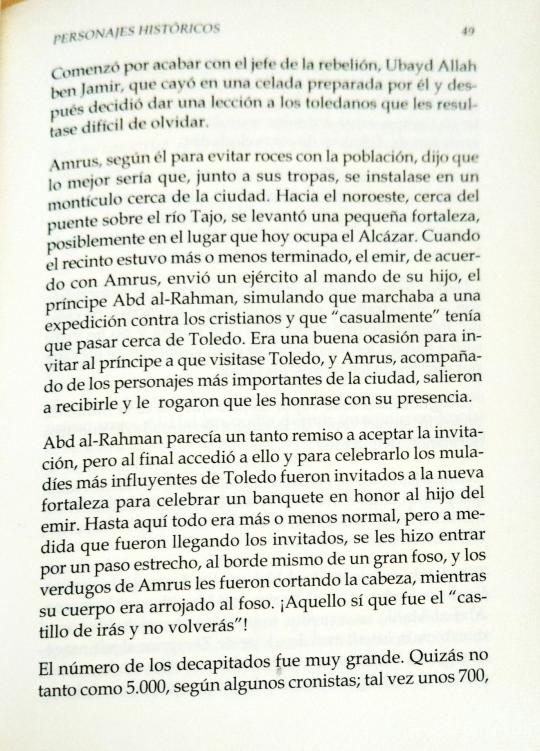
He began by eliminating the leader of the rebellion, Ubayd Allah ben Jamir,
who fell into a trap prepared by him and then decided to give a lesson to the people of Toledo that they would find difficult to forget.
Amrus, according to him to avoid friction with the population, said that the best
would be that, along with his troops, he would settle on a mound near the
city. Towards the northwest, near the bridge over the Tagus River, rose
a small fortress, possibly on the site now occupied by the Alcazar. When the enclosure was more or less finished, the emir, in agreement with Amrus, he sent an army under the command of his son, the prince Abd al-Rahman, pretending that he was going on an expedition against the
Christians and that "coincidentally" had to pass near Toledo. It was a good occasion to invite the prince to visit Toledo, and
Amrus, accompanied by the most important people of the city, they came out to receive him and begged him to honor them with his presence.
Abd al-Rahman seemed somewhat reluctant to accept the invitation, but
In the end he agreed to it and to celebrate it the most influential mula-díes
of Toledo were invited to the new fortress to celebrate a banquet in honor of the emir's son. Until then everything was more or less normal, but as the guests arrived, they became enter through a narrow passage, at the very edge of a large ditch, and the Amrus's executioners cut off their heads, while their bodies was thrown into the pit. That was the " castle of you will go and no you will come back"!
The number of those beheaded was very large. Maybe not as much as
5,000, according to some chroniclers; maybe about 700
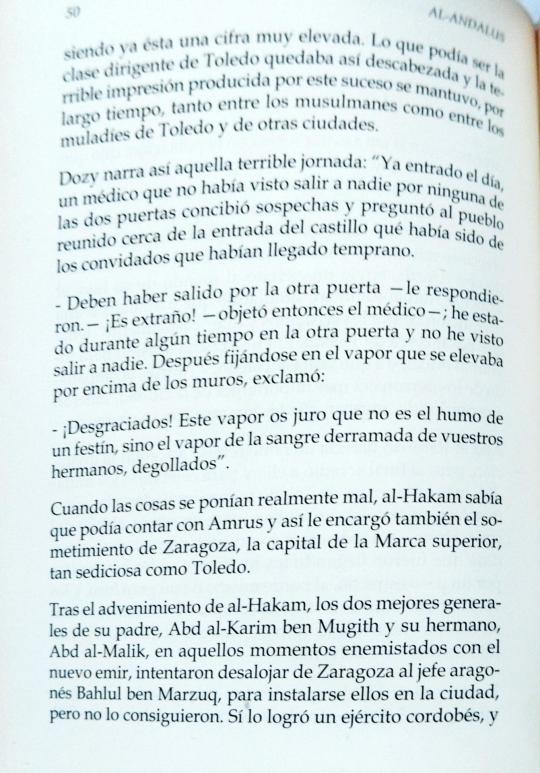
being a very high number. What the leading class of Toledo was thus beheaded and the terrible impression produced by this event remained, for a long time, both among the Muslims and among the muladies of Toledo and from other cities.
Dozy narrates that terrible day like this: "At daybreak, a doctor that had not seen anyone leave through either of the two door, became suspicious and asked the people gathered near the entrance of the castle what had happened to the guests who had arrived early.
"They must have gone out through the other door," they answered- It's strange!-the doctor then objected -; I have been for some time at the other door and I haven't seen anyone leave. After watching the steam rising above the walls,
exclaimed:
Unfortunates! I swear to you that this vapor is not the smoke of a feast,
but the vapor of the shed blood of your brothers, beheaded"
When things got really bad, al-Hakam knew that he could count on Amrus and so he also entrusted him with the submission
of Zaragoza, the capital of the Upper March, as seditious as Toledo.
After the advent of al-Hakam, the two best generals of his father, Abd al-Karim ben Mugith and his brother, Abd al-Malik, in
those moments at enmity with the new emir, they tried to evict the Aragonese chief Bahlul ben Marzuq from Zaragoza, to
They settled in the city, but they did not succeed. He got a Cordoban army, and
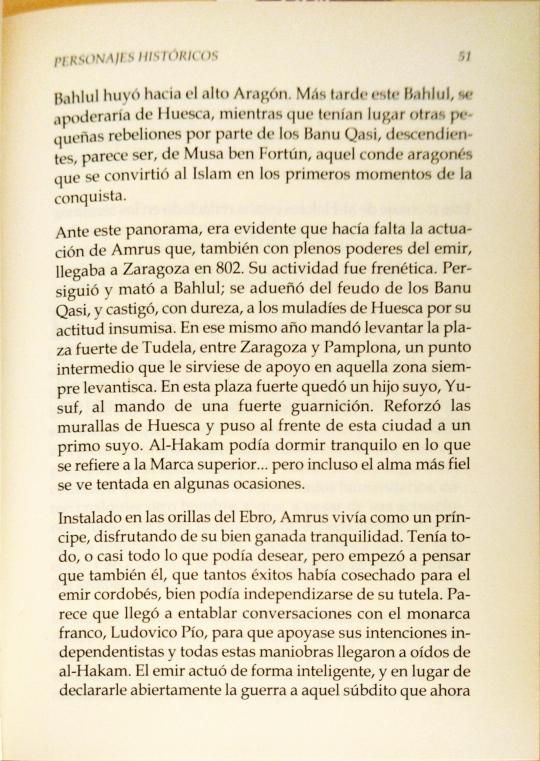
Bahlul fled towards upper Aragon. Later this Bahlul, would take over Huesca, while other small rebellions by the Banu Qasi took place, who were descendants, it seems, of Musa ben Fortún, that Aragonese count who converted to
Islam in the first moments of the conquest.
Given this panorama, it was evident that the action of Amrus who, also with full powers of the emir, came to Zaragoza in 802. Its activity was frenetic. Persecuted and killed Bahlul; took over the fiefdom of the Banu Qasi, and harshly punished
to the muladíes of Huesca for their rebellious attitude. In that same
year he ordered the construction of the stronghold of Tudela, between Zaragoza and Pamplona, an intermediate point that would serve as support in
that always upheaval area. In this stronghold there was his son, Yusuf, commanding a strong garrison. He reinforced the walls of Huesca and put one of his cousins in charge of this city.
Al-Hakam could sleep peacefully when it came to the Upper March... but even the most faithful soul is tempted in some
occasions.
Installed on the banks of the Ebro, Amrus lived like a prince, enjoying your well-earned peace of mind. He had everything, or almost everything he could want, but he began to think that he too,
which had garnered so much success for the emir of Cordoba, could become independent of his tutelage. It seems that he came to engage conversations with the Frankish monarch, Louis the Pious, so that
supported their independence intentions and all these maneuvers reached al-Hakam's ears. The emir acted
intelligent, and instead of openly declaring war on that subject that now
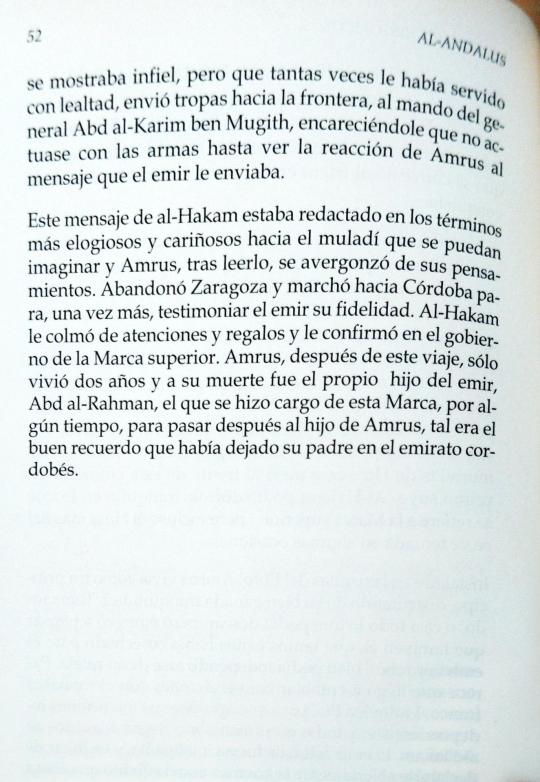
showed to be unfaithful, but that he had served him so many times with loyalty, he sent troops to the border, under the command of General Abd al-Karim ben Mugith, urging him not to act with the
weapons until seeing Amrus's reaction to the message that the emir gave him.
This message from al-Hakam was written in the most praiseworthy and affectionate towards the muladí that you can imagine and Amrus, after reading it, was ashamed of his thoughts. He left Zaragoza and marched towards Córdoba to, once again, bear witness the emir his fidelity. Al-Hakam showered him with attention and gifts and confirmed him in the government of the Upper March. Amrus, after
of this trip, he only lived two years and at his death the son of the emir, Abd al-Rahman, took charge of this March, for
some time, to later pass to the son of Amrus, such was the good memory that his father had left in the emirate of Cordoba.
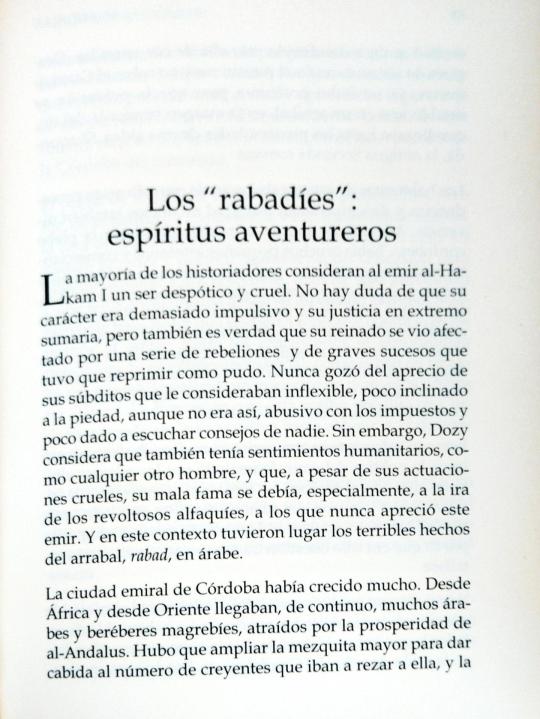
The "Rabadis":
adventurous spirits
Most historians consider the emir al-Ha-kam I despotic and cruel. There is no doubt that his character was too impulsive and his justice extremely summary, but it is also true that his reign was affected by a series of rebellions and serious events that he had to repress as best he could. He never enjoyed the appreciation of his subjects who considered him inflexible, little inclined to piety, although it was not like that, abusive with taxes and little given to listening advice from no one. However, Dozy believes that he also had humanitarian feelings, like any other man, and that, despite of his cruel actions, his bad reputation was due, especially, to the
wrath of the rebellious alfaquis, whom this emir never appreciated. And in this context, the terrible events of the suburb, rabad in Arabic, took place.
The emiral city of Córdoba had grown a lot. From Africa and from the East any Arabs and Berbers from the Maghreb continually arrived attracted by the prosperity of al-Andalus. The mosque had to be expanded larger to accommodate the number of believers who came to pray to it, and

The city was expanding beyond its walls. After the Roman bridge over the Guadalquivir was restored, there was no longer a problem for the population to settle in a suburb on the left bank of the river, which reached the vicinity
from a village, Shaqunda, ancient Roman Secunda.
The inhabitants of this suburb were of very diverse origins and they carried out a multitude of diverse jobs. Besides
of what could be considered the Cordoba plebs, there were many small Mullawad and Christian artisans and merchants, but
due to its proximity to the main mosque and the emiral palace, many Cordobans who were employed, either in the mosque or in the palace, they settled there. Among this diverse population, also found the alfaquíes, religious leaders of the doctrine
Malikí, who had reached a very prominent position and a very notable influence at court, especially with the emir
Hisham, father of al-Hakam I.
This suburb will soon become a focus of discontent towards the emir's policy, promoted by the same alfaquies who with
al-Hakam had neither the appreciation nor the influence that they achieved with
his predecessor. On the other hand, in the city al-Hakam did not enjoy of many sympathies so it was only a matter of time before the situation exploded.
And it happened that one day a rumor spread through the city that seventy-two leading citizens had been executed and that their corpses were going to be exposed, crucified, on the right bank
of the Guadalquivir. The mood be-
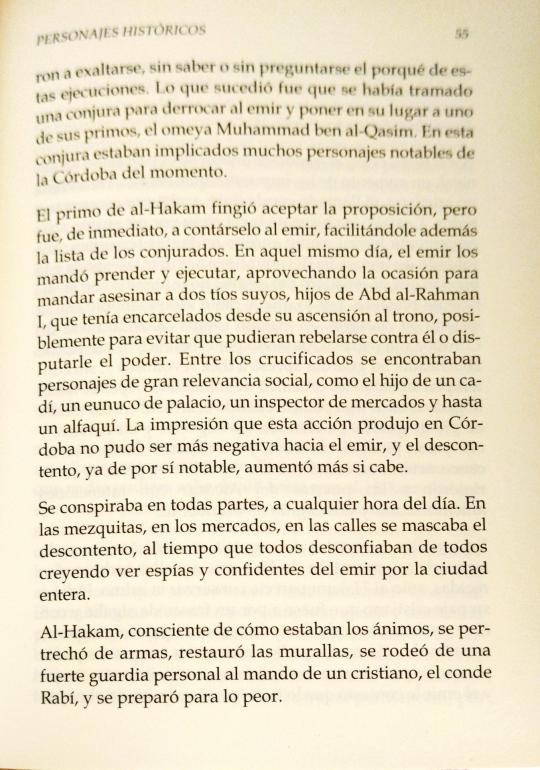
gan to exalt, without knowing or without asking themselves the reason for these executions. What happened was that a plot had been hatched to overthrow the emir
and put in his place one of his cousins, the Umayyad Muhammad ben al-Qasim. Many notable people from the Córdoba of that time were involved in this conspiracy.
Al-Hakam's cousin pretended to accept the proposal, but was immediately
to tell the emir, also providing him with the list of the conspirators. Inthat same day, the emir ordered them to be arrested and executed, taking advantage of the
occasion to order the murder of two of his uncles, sons of Abd al-Rahman I, who had been imprisoned since his ascension to the throne, possibly to prevent them from rebelling against him or challenging him for power. Between the crucified were figures of great social relevance, such as the
son of a cadi, a palace eunuch, a market inspector and even a alfaqui. The impression that this action produced in Córdoba could not be more negative towards the emir, and the discontent, already notable, increased.
There was a plotting everywhere, at any time of the day. In the mosques, in the markets, in the streets discontent was chewed, while everyone distrusted everyone, believing they saw spies and
confidants of the emir throughout the entire city.
Al-Hakam, aware of the mood, equipped himself withweapons, restored the walls, surrounded himself with a strong personal guard under the command of a Christian, Count Rabí, and prepared himself for the worst.
#book scans#al andalus. historical figures#al andalus. personajes históricos#al andalus#al andalus history#bookblr#historyblr#spanish history#sulayman ibn yaqzan ibn al-arabi#amrus ibn yusuf#rabadies#rabadi#al hakam i#al hakam i of córdoba#emirate of cordoba#umayyad emirate of córdoba#middle ages#rabadid dinasty#hisham i#hisham i of cordoba
9 notes
·
View notes
Text
Thinking about how all Copia wanted as a Cardinal was to be respected. He told himself that if he was in power, he wouldn't let others be belittled for their eccentricities and encourage everyone to be as genuine as possible. Even after he became Terzo's replacement, he stayed true to himself, hoping this would be the first step to reforming that harmful mindset. But as Nihil's health declined and Sister Imperator insinuated that he could be the next to ascend to papacy, Copia changed little bits about himself to be a more desirable candidate. He wanted that power to do good and figured a little bit of change wouldn't hurt if that meant he could help others.
After he became Papa, however, the pressure of adhering to the precedent his predecessors set was far more powerful than he could have imagined. Primo had and unmatched pious devotion to the Clergy and the Ghost project in general. Secondo had an intimidating stage presence that could suck the air out of the room with a single glance. Terzo was an expert at engaging the crowd, drawing in an audience like no Papa ever had before. Copia felt as if he was lacking. Many saw him as a great performer, yes, but under qualified, with no niche other than being the "weird" one. He was the first Papa to not be of the Emeritus bloodline, according to Nihil anyway. Nearly everyone else knew that Copia was a bastard. A son whose father never accepted him, because doing so would mean accepting his failures as a partner. Once Nihil was dead, however, Copia (endorsed by Sister, of course) had no issue airing out Nihil's dirty laundry. He embraced being an Emeritus, but as he did so, he felt aspects of himself fall away.
A new name. A new wardrobe. A new face.
What happened to the Cardinal? What happened to the self-made man who managed to ascend the ranks of the Ministry without any blood ties? What happened to the man that could prove that even someone as awkward as he was could have a measure of authority? Was he even himself anymore? Was this new power he wielded making him forget why he even wanted it in the first place? Was his goal of acceptance being consumed by blind ambition?
This realization made him desperately cling to anything that connected him to his past. Juice boxes. Video games. Tricycle rides around the Ministry. Anything he could do that would have gotten him criticized for being childish. He was still the same Copia, right?
#the band ghost#ghost headcanons#he is my little meow meow im sorry#totally not projecting here nope#anyway im sort of writing a fic about this#cardinal copia#papa emeritus iv#ghost band#headcanon#copia#angst#copia angst
23 notes
·
View notes
Text
Allaah will not disappoint a slave who invokes Him nor reject a believer who desires what is with Him. All triumph and openings are from Allaah, the Mighty and Majestic. He opens the doors for you to gain beneficial knowledge, perform righteous actions, moral character, etc. Just as some of the Pious Predecessors said:
((إن هذه الأخلاق وهائب، وإن الله - تبارك وتعالى - إذا أحب عبده وهبه منها))
“Indeed these noble characteristics are gifts from Allaah and when Allaah loves His slave, He bestows upon him from them, i.e. noble characteristics.”
Book: How Can You Become a Key Towards Good
Author: Shaykh ’Abdur-Razzāq ibn ‘Abdul-Muhsin al-‘Abbād al-Badr
Published by: Maktabatulirshad Publications
Translated by: Qaasim Mujahid
Page: 18
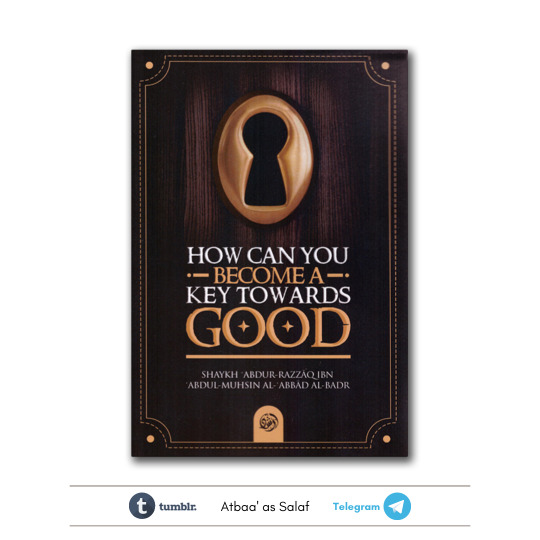
• JOIN OUR TELEGRAM CHANNEL:
41 notes
·
View notes